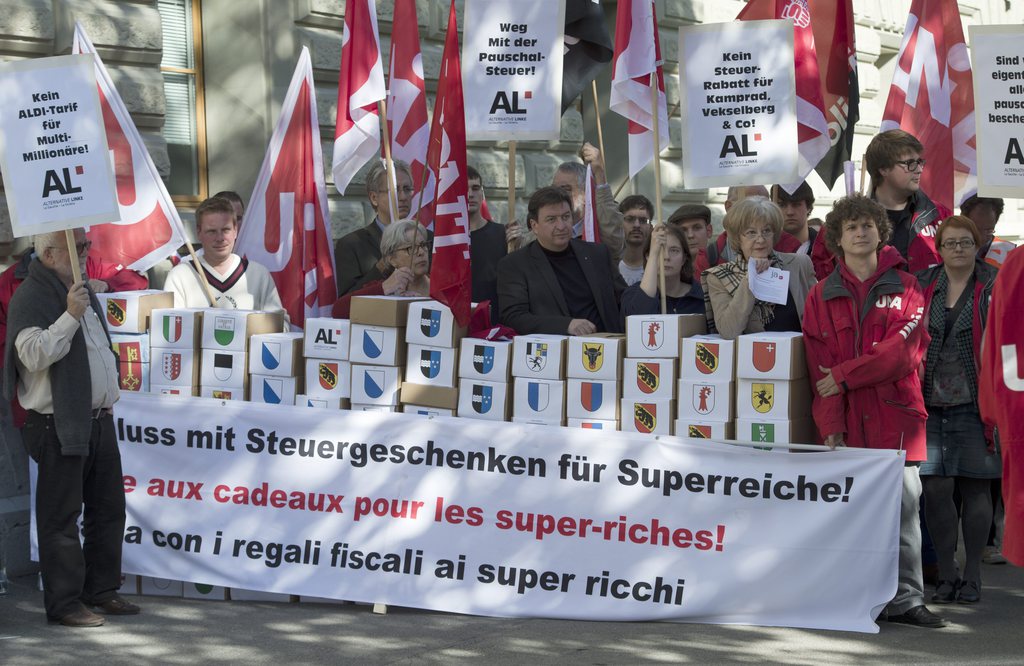Swiss to vote on scrapping lump sum tax

A leftwing committee has handed in the necessary signatures to force a nationwide vote to abolish a preferential tax system for wealthy foreigners. The ballot will take place after the cabinet and parliament have discussed the issue.
An alliance, including the Alternative List, the Alternative Left, the Social Democrats and trade unions, won the support of more than 103,000 citizens and submitted the signatures to the federal authorities in Bern on Friday.
Three-quarters of the signatures were collected in urban regions, particularly in the German-speaking part of Switzerland, while backing in the French- and Italian-speaking regions was weaker.
“The system of lump sum taxes undermines tax justice and goes against legal equality for all citizens,” said Niklaus Scherr of the Alternative List group.
The campaigners are confident of winning the nationwide ballot.
“I’m convinced that chances of winning a majority of voters are excellent,” said Susanne Leutenegger Oberholzer, senior parliamentarian of the centre-left Social Democratic Party.
The financial crisis and banking scandals over the past few years have undermined the credibility of the tax system even among members of centrist and rightwing parties, according to the campaigners.
“People are fed up with the privileges for the super-rich,” said Andreas Rieger of the Unia trade union group.
Official figures from 2010 show there are 5,445 people – mostly wealthy foreigners – who qualify for the preferential treatment which is based on their estimated cost of living instead of the combined annual income and wealth.
Revenue for the federal authorities from lump sum taxes came to nearly SFr700 million ($758 million) in 2010.
Under Switzerland’s federalist system, taxes are due to the local, cantonal and federal authorities but at different rates.
Upping stakes
Parliament last month came out in favour of tightening regulations. The federal lump sum tax was set at seven times the rental value a property used as residence, instead of five. Beneficiaries must have an annual income of at least SFr400,000.
Opponents argued stricter fiscal conditions would result in a slump in revenue and indirectly jeopardise about 20,000 jobs, particularly in remote regions and mountain resorts.
Finance Minister Eveline Widmer-Schlumpf described the reform as a compromise solution to appease critics of the preferential tax system.
Since 2009, five of the country’s 26 cantons, including Zurich and Basel City, have abolished lump sum taxation, several others have decided to set a minimum annual income of beneficiaries at between SFr400,000 and SFr600,000 a year.
Attempts are underway in at least four cantons, including Geneva, to force a ballot at a local level.
The tailor-made system was first introduced in western Switzerland in 1862 – attracting many foreigners at retiring age to the Lake Geneva region – and became popular across the country in the first half of the 20th century.
The cabinet will set a date for the nationwide ballot following debates in parliament.
Beneficiaries must live at least six months and one day in Switzerland and have their principal residence in the country.
They must be making Switzerland their tax home for the first time, or have lived outside the country for at least ten years.
They must not be employed within Switzerland.
Most of the 5,445 beneficiaries (official data from 2010) live on Lake Geneva or in mountain resorts, mainly in cantons Vaud, Valais, Geneva, Ticino, Graubünden and Bern.
Estimates put the figure at 5,600 beneficiaries.
The Organisation for Economic Co-operation and Development (OECD) last January called on Switzerland to abolish the lump sum tax system.

In compliance with the JTI standards
More: SWI swissinfo.ch certified by the Journalism Trust Initiative




You can find an overview of ongoing debates with our journalists here. Please join us!
If you want to start a conversation about a topic raised in this article or want to report factual errors, email us at english@swissinfo.ch.